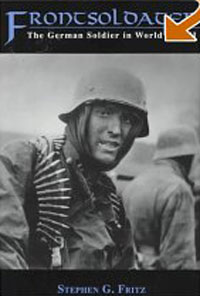Drawn from letters, diaries and memoirs, this impressive study presents a rounded, detailed picture of the daily life of the Landser-the ordinary German infantryman of WWII-and takes an unblinking look at the stark realities of combat, particularly on the Russian front, where 80% of the German soldiers fought; the hardships endured; and the crushing anxiety of being surrounded by death and killing. The evidence that surfaces in these pages demonstrates that the remarkable unit cohesion and fighting performance of the Landser was due in large part to the bonds of military friendship inherited from Prussian tradition; Wehrmacht leaders "raised the concept of camaraderie almost to the level of strategic doctrine." The study also reveals ways in which the German soldier embraced ideological commitment to National Socialism and how, encouraged by Nazi propaganda, he was free to engage in virtually unlimited criminality if it was directed against the so-called enemies of the German people. Fritz, who teaches history at East Tennessee State, makes edifying comparisons between the Landser and his American, British and Russian counterparts. His book helps explain why the German army was so relentlessly efficient in battle. Это и многое другое вы найдете в книге Frontsoldaten: The German Soldier in World War II (Stephen G. Fritz)
Frontsoldaten: The German Soldier in World War II Stephen G. Fritz
Подробная информация о книге «Frontsoldaten: The German Soldier in World War II Stephen G. Fritz». Сайт не предоставляет возможности читать онлайн или скачать бесплатно книгу «Frontsoldaten: The German Soldier in World War II Stephen G. Fritz»
